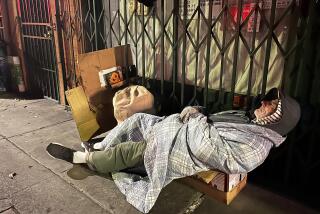Quick Ruling in Checkpoint Suit Urged
- Share via
An American Civil Liberties Union attorney said Wednesday that the constitutionality of random police sobriety checkpoints to catch drunken drivers should be decided as soon as possible to avoid discrepant rulings in Municipal Court cases.
The ACLU on Nov. 19 filed a lawsuit challenging the constitutionality of the checkpoints.
Amitai Schwartz, the lawyer who filed the ACLU lawsuit before the 1st District Court of Appeal in San Francisco, said a speedy resolution would give proper guidance to municipal courts and prevent a deluge of courtroom protests now that an Orange County Municipal Court judge has ruled that the checkpoints are unconstitutional.
Evidence Disallowed
On Tuesday, in the first ruling by a Municipal Court judge on the checkpoints, North Municipal Judge Betty Elias disallowed evidence against a drunk driving suspect arrested by Anaheim police at a checkpoint on Dec. 22. She said the police had “no probable cause” to detain Wayne LeRoy Chapman, 40, of Tustin, who was released from jail immediately after Elias’ ruling. Chapman was found to have a blood alcohol level above the legal limit when he was arrested.
Chapman had remained in jail since Dec. 22 because it was his third arrest on suspicion of drunk driving and he was unable to post the $10,000 bail.
Elias’ ruling, which is not binding on other municipal judges, is being appealed, Anaheim City Atty. William P. Hopkins said Wednesday. A date for the appeal before a county Superior Court has not been set.
Between Dec. 14 and Dec. 31, Anaheim police conducted seven checkpoints and stopped 6,934 motorists, 44 of whom were arrested on suspicion of drunk driving. The California Highway Patrol arrested 53 people statewide on the same charge at various sobriety checkpoints during the same period.
Schwartz, in a telephone interview from San Francisco, said the ACLU decided to file the lawsuit on Nov. 19--even before the program was begun--anticipating that the sobriety checkpoints would be become a statewide issue. However, the Court of Appeal “probably” will not set the court date until after Feb. 14, he said.
“All the indications around Thanksgiving were that this would become a statewide issue. We wanted to resolve it as soon as possible to avoid having every Municipal Court rule on it,” Schwartz said.
The ACLU attorney also said the police sobriety checkpoints violate constitutional rights in subjecting innocent drivers to warrantless searches.
“We believe that historically the police have been required to have ‘just cause’ to stop a person walking on the street or driving on the road. It dilutes the theory that if you are not breaking the law, you will not be stopped,” Schwartz said.
Program Checked With State
Anaheim Police Chief Jimmie Kennedy, who indicated his department would continue to use the sobriety checkpoints, said the department studied state attorney general’s guidelines before initiating the procedure. An attorney general’s opinion issued last November said a sobriety checkpoint was as legal and constitutional as a border checkpoint, the precise point the ACLU is contesting.
“We checked this out thoroughly before we went into the program,” Kennedy said. “We checked with the California Highway Patrol and the attorney general’s opinion to operate it properly. We did exactly that.”
But MacDonald Becket Jr., Chapman’s public defender, said there is “a big distinction” between a sobriety checkpoint and a border checkpoint, where “it makes sense” to determine if a person is legally entering the country.
Becket also questioned Kennedy’s contention that the sobriety checkpoint is “a viable tool” in enforcement against drunk drivers.
“There is no reason to put up the mass checkpoint and check everyone just to catch the one,” he said. “There are no proven statistics that show (the checkpoint) is more successful than the traditional approach.”
More to Read
Sign up for Essential California
The most important California stories and recommendations in your inbox every morning.
You may occasionally receive promotional content from the Los Angeles Times.










